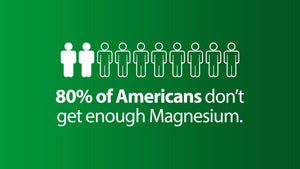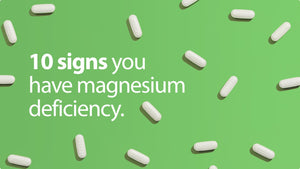Magnesium deficiency is running rampant among Americans. One study sponsored by the National Institutes of Health shows that 68% of Americans are magnesium deficient. 1 Other experts put the number closer 80%.2
Data from the 1999-2000 National Health and Nutrition Examination Survey suggest that substantial numbers of adults in the U.S. don’t get even the minimal amounts of magnesium recommended.
Of all the minerals required for good health, calcium has been pushed into the spotlight. There has been a flood of calcium-fortified foods, beverages, and supplements. Ironically, without magnesium, calcium cannot be properly used or absorbed by the body.
Understanding the RDI
The Recommended Dietary Intake (RDI) for nutrients is the minimal amount needed to avoid deficiency—not the maximum amount required for good health.
Ultimately what your body craves to maintain optimal health depends upon a variety of factors including your body type, age, diet, medications, and health. Any one (or all) of these factors determines your risk for magnesium deficiency and could undermine your body’s ability to get the magnesium it needs.
RDI For Magnesium:
| Age | Male (mg/day) |
Female (mg/day) |
Pregnancy (mg/day) |
Lactation (mg/day) |
| 1-3 | 80 | 80 | - | - |
| 4-8 | 130 | 130 | - | - |
| 9-13 | 240 | 240 | - | - |
| 14-18 | 410 | 360 | 400 | 360 |
| 19-30 | 400 | 310 | 350 | 310 |
| 31+ | 420 | 320 | 360 | 320 |
| From the Institute of Medicine of the National Academy of Sciences. | ||||
Inside Magnesium Absorption
Dietary magnesium is absorbed into the bloodstream through the small intestine. But only about 50% of it is absorbed; the rest is excreted in the stool or urine. There are a number of conditions not directly within your control that affect magnesium absorption:
- Availability of certain molecules and hormones.
- Rate of water absorption.
- The amount of calcium, potassium, phosphorus, sodium, iron, and lactose in the body.
But there are other factors within your control that can directly affect magnesium absorption.
The Magnesium Deficiency “Diet”
If you eat a balanced and healthy diet with adequate amounts of protein, you can still realize some health benefits just by taking 150 mg of an effective magnesium supplement every day. 3
But if you eat like a typical American—many processed and refined foods, convenience foods, and junk foods—then you’re probably seriously magnesium deficient. Just the process of refining foods strips nutrients, including magnesium. Some examples:
- Dry roasting nuts removes the highly nutritious oils which contain magnesium.
- Milling flour from grains strips magnesium from the grain.
- Sugar in anything uses up magnesium.
- Fluoridated, softened, and distilled water depletes magnesium.
- Carbonated beverages and some processed foods, like lunch meat, contain phosphates that bind to magnesium molecules and flush it out of the body.
- Alcohol blocks magnesium, especially if you have three or more drinks a day.
- Coffee works like a diuretic to flush magnesium from of the body.
- Some foods—like raw or roasted nuts and seeds, soybeans, spinach, and chard—contain compounds called phytic acid and oxalic acid which can cause magnesium to be eliminated from the body.
You might even think you’re doing yourself a favor by eating frozen vegetables. But even those are sprayed with chemicals to enhance their color which, when boiled in water, can leach magnesium from the vegetables into the water. (So save the water for use as soup stock later on!)
Drugs & Magnesium Deficiency
One of the leading researchers on magnesium deficiency, Dr. Mildred Seelig, found that many of the side effects of drugs are actually symptoms of magnesium deficiency. The drugs either increased the demand for magnesium in the body, or they depleted magnesium.4
According to the Physician’s Desk Reference, these common drugs can create a magnesium deficiency: 5
- Common diuretics and cardiac drugs
- Birth control pills
- Insulin
- Digitalis
- Tetracycline and other antibiotics
- Cortisone
Make sure your body is getting the magnesium it needs.
The Stomach Acid Paradox
Those with digestive issues often blame acid indigestion or too much stomach acid when the problem is simply bad eating habits. Greasy and sugary junk foods lack digestive enzymes that make these non-nutritious foods difficult to digest — and results in the burning feeling that we call heartburn or acid indigestion.
But your body also makes digestive enzymes, and these enzymes require ample amounts of stomach acid to efficiently digest food and to change life-giving dietary minerals into an absorbable form. The end result of a reduction in stomach acid is that the body can’t absorb the magnesium and other minerals it needs from food — and a deficiency occurs.
Of course, this goes against everything we’ve been taught about stomach acid. Madison Avenue produces countless ads showing how eating unhealthy foods causes too much stomach acid — which makes you miserable. But what really makes you miserable is the lack of digestive enzymes in the food, and the inability of the body to create digestive enzymes because of a lack of stomach acid!
Worse, these ads suggest that a little “plop, plop, fizz, fizz” provides instant relief of your upset stomach. Antacids (“anti-acid”) neutralize stomach acid that’s desperately needed to digest food and adequately absorb the minerals your body needs. And antacids containing calcium carbonate further deplete magnesium by excreting it right out of the body.
In truth, the best “cure” is to eat healthy — not to take an antacid.
Finally, low stomach or hydrochloric acid — along with magnesium deficiency — is often found in the elderly.6
The Dirty Secret of “Magnesium-Rich” Foods
You can find ample amounts of magnesium in green vegetables, nuts, seeds, and whole grains — but only if they’re grown under optimal growing conditions by an organic farmer who also uses a nutrient-rich fertilizer containing magnesium.
Barring that, you’ll have to settle for “magnesium-rich” foods grown on corporate farms in depleted soils. And since magnesium is rarely included in fertilizers, no magnesium in the soil means no magnesium in the plants.
So while eating magnesium-rich foods is a noble goal, it just might not be realistic given the lack of nutrients found in our food today.
The Calcium Conundrum
As we mentioned earlier, calcium dances in the spotlight while magnesium sits backstage waiting to be called. But these two minerals are so critical to many functions in the body that not having enough magnesium — and an excess of calcium — can cause serious health complications.
Consider any movement by the body, for example. Electrical impulses transmit signals to the nerves and brain, and movement occurs. But the conductor for these impulses is calcium which enters the cells through calcium channels operated by magnesium. Once calcium does its work, magnesium helps the body get rid of it.
If there’s no magnesium, then the calcium builds up in the cells. That’s why magnesium is often called nature’s calcium channel blocker. 7,8,9
Read more about how calcium and magnesium work together.
Avoid Becoming a Magnesium-Deficient Statistic
So how do you avoid becoming a magnesium deficient statistic and putting yourself at risk for some serious chronic conditions later on?
- Early signs of magnesium deficiency include chronic constipation, headaches and migraines, insulin resistance, PMS, leg cramps, muscle twitches, and more. Left untreated, a magnesium deficiency can lead to more life-threatening conditions such as heart disease, hypertension, stroke, type 2 diabetes, osteoporosis, and others. This simple assessment can help you determine if you’re magnesium deficient. You can also ask your healthcare professional to test you for magnesium deficiency.
- Avoid coffee, alcohol, carbonated and sugary beverages. Stick to drinking water, particularly bottled water fortified with magnesium. Although it varies widely from city to city, tap water can also be a good source of magnesium. Check with your city’s water department to find out how much magnesium is in your tap water.
- Increase stomach acid. Low stomach acid — which can result from digestive disorders or by taking antacids — prevents minerals like magnesium from being properly absorbed. Use betaine hydrochloride to raise stomach acid levels and allow magnesium to be absorbed.
- Eat healthier foods. Avoid highly processed foods. Find an organic grower that uses magnesium-enhanced fertilizer to condition depleted soil and maximize nutrient content. And, whenever possible, eat raw foods (heated to no more than 110°F) and steam vegetables instead of boiling them to retain nutrients.
- Snack on sprouted, organic nuts and seeds. The process of sprouting releases the phytic acid that causes magnesium to be flushed out of the body. It also helps retain enzymes that help your body digest the nuts and seeds. While all nuts and seeds contain magnesium, pumpkin seeds are an especially rich source.
- Supplement your diet with magnesium. Look for a sustained-release formula that allows you to take more than the RDA without a laxative effect.
And remember… even if you eat a balanced diet with adequate amounts of protein, you can still realize some health benefits just by taking 150 mg of an effective magnesium supplement every day. 4 But if you’re magnesium deficient, you’ll need more — and much more than the RDA — to replenish your deficiency and get your health back.
Cited Sources:
- “Dietary Magnesium and C-reactive Protein Levels,” Journal of the American College of Nutrition, Vol. 24, No. 3, 166-171 (2005).
- Jaffe R MD. “How to Know if You are Magnesium Deficient: 75% of Americans Are” (transcript), 06/16/05, www.innovativehealing.com
- Eades M & Eades A. The Protein Power Lifeplan, Warner Books: New York, 1999.
- Dean C, MD. The Miracle of Magnesium, Ballantine Books: New York, 2003.
- Physicians’ Desk Reference. 56th ed. Medical Economics, 2002.
- Werbach MR. Nutritional Influences on Illness, Thorstons Publishing Group, Wellingborough, Northamptonshire, 1989.
- Iseri LT & French JH. “Magnesium: nature’s physiologic calcium blocker.” Am Heart J, 108, 188-193, 1984.
- Seelig MS. “Cardiovascular reactions to stress intensified by magnesium deficit in consequences of magnesium deficiency on the enhancement of stress reactions; preventive and therapeutic implications: a review,” J Am Coll Nutr, 13, 5:429-446, 1994.
- Rodale JR. Magnesium: The Nutrient that Could Change Your Life, Rodale Press: Emmaus, PA, 1971.
Jigsaw Magnesium w/SRT is the easiest and most effective way to get the magnesium your body needs.






















